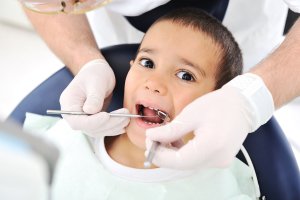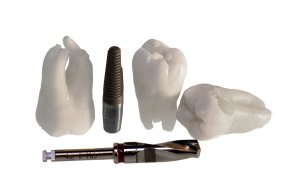-
What Happens at Your Child’s First Dental Visit?
 When you bring your child in for the first visit at Dr. Spalitto’s dentist office near St. Louis , you can expect a visit that jumpstarts a lifetime of good dental hygiene. Focusing on dental visits while your child is still young leads to a happy and healthy mouth. Keep reading to learn more about what to expect from this first dental visit:
When you bring your child in for the first visit at Dr. Spalitto’s dentist office near St. Louis , you can expect a visit that jumpstarts a lifetime of good dental hygiene. Focusing on dental visits while your child is still young leads to a happy and healthy mouth. Keep reading to learn more about what to expect from this first dental visit:You Talk About Your Child’s Medical History
Before Dr. Spalitto starts the exam, he will sit down to talk to you about your child’s medical history. The more information you can give about your child’s health, the more effective the visit will be. You should also list any medications that your child takes so Dr. Spalitto knows how to proceed with the exam.
Dr. Spalitto Examines Your Child’s Mouth
The purpose of this dental visit is for Dr. Spalitto to thoroughly examine your child’s mouth to determine the current condition of his or her teeth and gums. This exam gives the dentist information about future growth and development. It also allows Dr. Spalitto to check out the child’s oral hygiene to determine if there is a risk of tooth decay or if there is already evidence of cavities.
Dr. Spalitto Cleans the Teeth
This first visit also gives Dr. Spalitto the opportunity to clean your child’s teeth and gums to remove any plaque or tartar that you might have missed with at-home brushing or flossing. During the cleaning, Dr. Spalitto can also give you some tips about the proper way to care for your child’s teeth and gums at home.
You Learn More About Pediatric Dental Care
Take advantage of this first dental visit by asking Dr. Spalitto any question you have about your child’s developing mouth. You and the dentist can discuss habits like using a pacifier or sucking the thumb. With your discussion about dental treatments, you can figure out exactly what you need to do to help your child grow up with a healthy, beautiful smile.
-
A Look at the Solea Dental Laser
 Dr. Spalitto only uses the best dental resources to offer you the most comprehensive care for your oral health needs. The Solea dental laser is a high-tech dental tool that provides a pain-free way to get the oral care you need. This laser and one of the top dentists in St. Louis can completely change the way you care for your teeth and gums. The Laser allows for patients to have no numbing in 95% procedures that it can used on. This is only the second Laser of its kind in St. Louis. This Laser is Revolutionary for Dentistry and will change the way people feel about Dentistry as a whole. No pain, no anesthesia, no drill and less time in the chair. Keep reading to find out how:
Dr. Spalitto only uses the best dental resources to offer you the most comprehensive care for your oral health needs. The Solea dental laser is a high-tech dental tool that provides a pain-free way to get the oral care you need. This laser and one of the top dentists in St. Louis can completely change the way you care for your teeth and gums. The Laser allows for patients to have no numbing in 95% procedures that it can used on. This is only the second Laser of its kind in St. Louis. This Laser is Revolutionary for Dentistry and will change the way people feel about Dentistry as a whole. No pain, no anesthesia, no drill and less time in the chair. Keep reading to find out how:The First of Its Kind
Solea is the first CO2 laser system that has earned FDA approval for both hard and soft tissue ablation. Using this impressive technology, Dr. Spalitto can now offer more precise treatment than ever before. The Solea dental laser is quick and quiet, which helps you get the care you need without dental anxiety affecting the way you feel during your visit. Patients who have had Solea treatments love the way the laser offers quick and efficient treatments.
No Anesthesia and No Blood
The Solea dental laser is so revolutionary because it allows dentists like Dr. Spalitto to perform important procedures without the need for anesthesia. Since the laser does all the cutting, patients do not bleed while they get their laser treatment. This saves you and Dr. Spalitto a lot of time. The laser allows the dentist to be as efficient as possible so you can get the treatment you need and get back to your busy day.
Complete Control
The Solea dental laser allows Dr. Spalitto to perfect his already impressive skills by giving him complete control as he performs various dental procedures. The laser comes with a Computer Aided Preparation (CAP) system that includes a hand piece, a foot pedal, and a touch screen to give Dr. Spalitto complete control over the procedure from start to finish. If you are in need of dental treatment, schedule a visit with Dr. Spalitto to find out how the Solea dental laser can work for you.
This Laser offers patients an entire new experience at the Dentist. Dr. Spalitto knows it is important to have the most cutting edge technology to offer his patients and with the Solea Laser he does it again.
-
Tips for Preventing Cavities
 If you feel pain or discomfort in your tooth, it’s important that you visit West County Dental in St. Louis as soon as possible. Dr. Spalitto will examine your teeth, and if he finds tooth decay, he will recommend fillings or even a root canal. If you forgo treatment, your teeth may become so damaged that they require extraction. To avoid unwanted dental issues, you must practice consistent prevention methods.
If you feel pain or discomfort in your tooth, it’s important that you visit West County Dental in St. Louis as soon as possible. Dr. Spalitto will examine your teeth, and if he finds tooth decay, he will recommend fillings or even a root canal. If you forgo treatment, your teeth may become so damaged that they require extraction. To avoid unwanted dental issues, you must practice consistent prevention methods.Though important, daily brushing and flossing are only part of good oral hygiene. Your oral health has a lot to do with what you eat, drink, and chew. The bacteria in your mouth feed on sugar and create plaque, which attacks tooth enamel. By restricting your consumption of sugary foods and beverages—including candy and soft drinks—you can reduce the formation of plaque. Even if you have a healthy diet, you must still clean your teeth each day to keep them free of decay. Dr. Spalitto also recommends avoiding the habitual chewing of ice, pen caps, and other objects that can crack teeth or wear down enamel.
-
Feeding Your Family a Mouth-Healthy Diet
 Practicing good oral hygiene will help you avoid dental problems for a lifetime. Brushing, flossing, and making regular visits to West County Dental of St. Louis can prevent gum disease and tooth decay. However, good hygiene practices may not mean as much if you don’t eat a mouth-healthy diet. The foods and beverages you consume greatly impact the health of your teeth and gums. To keep your smile strong, keep these diet suggestions in mind:
Practicing good oral hygiene will help you avoid dental problems for a lifetime. Brushing, flossing, and making regular visits to West County Dental of St. Louis can prevent gum disease and tooth decay. However, good hygiene practices may not mean as much if you don’t eat a mouth-healthy diet. The foods and beverages you consume greatly impact the health of your teeth and gums. To keep your smile strong, keep these diet suggestions in mind:Focus on Fresh Produce
Dr. Spalitto of West County Dental stresses the importance of eating fruits, vegetables, and other foods that are beneficial for healthy teeth and gums. Many fruits and vegetables are fibrous, which helps with the natural cleaning of oral contaminants. Vegetables typically have low sugar content as well, which limits the ability of bacteria to create plaque. In addition, produce is dense in nutrients, and can provide a wealth of vitamins and minerals that fortify tooth and gum health.
Include Calcium-Rich Products
The bone that supports your teeth is made largely of calcium. This substance helps teeth retain a strong and rigid structure, which is necessary for chewing and eating. Consuming plenty of calcium-rich products—including low fat milk, yogurt, and cheese—can provide ample amounts of calcium to support your oral health.
Restrict Sweet Beverages
Many people know that residual food particles can get stuck between teeth, hastening the development of plaque and gum disease. As a result, they might wash down their meals with a large cup of cola, fruit juice, or sweetened tea in the hopes of dislodging food remnants and lowering the risk of cavities. Unfortunately, sugary beverages only heighten the danger of tooth decay. If you normally drink soda, juice, or another sugar-laden drink, that could be the reason for your dental issues. Instead, make water your beverage of choice. This single change to your diet could dramatically reduce tooth decay and improve your general wellbeing.
-
The Importance of Visiting the Dentist
Home dental care is crucial for preventing cavities and gum disease. As this video explains, seeing a dentist is an equally important part of oral health. Dr. Spalitto of West County Dental is an excellent St. Louis dentist with more than a decade of experience.
While brushing and flossing reduce the formation of plaque, they don’t entirely prevent the buildup of this harmful substance. Once plaque hardens into tartar, the only way to remove it is via a professional teeth cleaning. Dental exams can also reveal the presence of tooth decay and periodontal disease, which can cause extensive tooth and gum damage. Dr. Spalitto can also detect the warning signs of oral cancer—a life-threatening condition. For the sake of your oral health, make it a priority to visit West County Dental at least twice each year.
-
The Truth Behind Common Root Canal Myths
 Dr. Spalitto’s primary goal is to brighten your smile. Unfortunately, tooth decay can seriously compromise this goal. Advanced tooth decay may require a root canal, which is a routine procedure addressing cavities that reach the tooth’s interior. As invaluable as root canals are to dental health, many people misunderstand the procedure’s place in professional dental care. Recognizing the necessity and benefits of a root canal can help you better understand this type of treatment.
Dr. Spalitto’s primary goal is to brighten your smile. Unfortunately, tooth decay can seriously compromise this goal. Advanced tooth decay may require a root canal, which is a routine procedure addressing cavities that reach the tooth’s interior. As invaluable as root canals are to dental health, many people misunderstand the procedure’s place in professional dental care. Recognizing the necessity and benefits of a root canal can help you better understand this type of treatment.Myth: Root Canals Damage Teeth
When Dr. Spalitto performs a root canal, he creates a small hole that reaches the inside of the tooth. Through this hole, he can extract infected tissues from the tooth interior. While this hole may very slightly compromise the overall strength of the tooth, an untreated infection can cause considerably more damage. If an infection is left to fester, it will affect not only your tooth, but also the surrounding gum tissue and bone. Root canals both stop infections and preserve the integrity of teeth.
Myth: Tooth Infections Can Heal Without Root Canals
Doctors often prescribe antibiotics to eliminate infections in the body. Once bacteria reach the interior of a tooth, however, affected tissues will continue to decay until Dr. Spalitto manually extracts them. During root canal therapy, Dr. Spalitto might introduce medication that can kill lingering bacteria, but the only way to fully address a tooth infection—short of tooth extraction, that is—is through a root canal.
Myth: Root Canals Hurt
Severe procedural pain is perhaps one of the most prevalent misconceptions about root canals. In fact, a root canal is a minimally invasive procedure that is more comfortable than you might imagine. Dr. Spalitto always has the comfort of his patients in mind when providing treatment; if you require a root canal, Dr. Spalitto will administer pain relief agents to block discomfort during the procedure. If you normally experience dental anxiety, he can also offer sedation dentistry services to relax you as you undergo treatment. This will allow you to get the care you need without pain or stress.
-
What to Expect from Your Child’s Dental Visit
 You can schedule an appointment for your child with a family dentist in West County of St. Louis as soon as his or her first tooth begins to grow. Taking care of your child’s teeth and gums plays a crucial role in ensuring your child is off to a healthy start in life. If your child develops a dental disease that is left untreated, he or she can suffer serious oral health problems, including gum disease.
You can schedule an appointment for your child with a family dentist in West County of St. Louis as soon as his or her first tooth begins to grow. Taking care of your child’s teeth and gums plays a crucial role in ensuring your child is off to a healthy start in life. If your child develops a dental disease that is left untreated, he or she can suffer serious oral health problems, including gum disease.Daily brushing, good nutrition, and regular dental visits can all help prevent dental disease and cavities. Children learn healthy dental habits from their parents and caregivers, so it’s important to be a positive role model and continue to schedule your own appointments with the dentist. At your child’s first appointment, your family dentist will learn about your child’s health history and conduct a complete oral exam. This allows your dentist to check the growth and development and detect any oral health issues. Your dentist will also clean your child’s teeth and provide suggestions for daily dental care. He or she can also tell you if your child is getting enough fluoride.
-
The Benefits of Dental Implants
 Compared to other options for restoring missing or damaged teeth, dental implants in West County of St. Louis are often the first choice among dentists and dental patients. While other tooth restoration options can interfere with eating, smiling, and speaking, dental implants function like natural teeth. With proper care, dental implants can also last more than 10 years, so they offer a long-term solution to maintaining oral health. Here’s a closer look at the benefits of dental implants.
Compared to other options for restoring missing or damaged teeth, dental implants in West County of St. Louis are often the first choice among dentists and dental patients. While other tooth restoration options can interfere with eating, smiling, and speaking, dental implants function like natural teeth. With proper care, dental implants can also last more than 10 years, so they offer a long-term solution to maintaining oral health. Here’s a closer look at the benefits of dental implants.Protect Healthy Bone
If you have lost one or more permanent teeth, leaving the empty spaces in your mouth can lead to additional health issues, including gum disease. In addition, you will no longer be using your jawbone in the affected area to support your natural teeth. As a result, the jawbone will begin to lose its strength and firmness. Dental implants actually preserve and stimulate the natural bone, which can help prevent loss of the jawbone.
Alleviate Anxiety
Your dentist’s office likely offers a range of tooth restoration options , including dentures. While dentures can effectively replace your missing teeth, you may find that you worry about them slipping. With dental implants, your tooth restorations stay permanently in your mouth just like natural teeth. This means you can brush, floss, and care for the implants in the same exact way you would care for your natural teeth.
Lower Cavity Risk
Dental implants may look like your natural teeth, but they can’t develop cavities like your natural teeth. However, you will still need to visit your family dentist regularly and care for your gums every day to help prevent other oral health issues.
Protect Healthy Teeth
In order to place a bridge in your mouth, your dentist will need to grind away the adjacent teeth. This process ends up damaging your healthy teeth in order to restore your missing teeth. The bridge is then attached to your modified healthy teeth for support. Dental implants, on the other hand, are placed directly into the jawbone without impacting the neighboring healthy teeth. Once in place, the implant helps prevent your healthy teeth from shifting into the empty gum space.
-
Taking Care of Your Child’s Teeth
 As soon as your child begins getting his or her baby teeth, it’s time to talk to your dentist in West County of St. Louis about proper care. These first teeth may not be permanent, but they help hold the space for adult teeth, so it’s still important to protect your child against tooth decay and gum disease. If your child does develop tooth decay, he or she may experience pain, difficulty chewing, and embarrassment talking or smiling.
As soon as your child begins getting his or her baby teeth, it’s time to talk to your dentist in West County of St. Louis about proper care. These first teeth may not be permanent, but they help hold the space for adult teeth, so it’s still important to protect your child against tooth decay and gum disease. If your child does develop tooth decay, he or she may experience pain, difficulty chewing, and embarrassment talking or smiling.Start with the First Tooth
Unfortunately, tooth decay is incredibly common among children. The U.S. Department of Health and Human Services estimates around one in two children develop decay in their baby teeth. While consuming sugary foods and drinks increases a child’s risk of developing tooth decay, healthy habits like brushing and flossing can help prevent this common childhood disease. As a parent, you should start cleaning your child’s baby teeth with a cloth or soft children’s toothbrush as soon as they begin erupting. You should clean these baby teeth after feeding and right before bedtime.
Encourage Regular Brushing
At age two, you can begin brushing your child’s teeth with fluoride toothpaste. You can start using fluoride toothpaste even earlier if your dentist recommends it. By age four or five, your child can start brushing his or her own teeth. However, you need to watch your child to ensure he or she actually brushes all of the teeth. For safety reasons, you should also make sure your child spits the toothpaste out, as swallowing too much fluoride can lead to white spots in adult teeth. Dentists recommend you continue watching your child brush his or her teeth until the age of seven or eight.
Take Your Child to the Dentist
By age one, your child should have already had his or her first dental checkup. If your family dentist doesn’t take young patients, you can ask your pediatrician to recommend a dentist who is good with kids. Visiting the dentist can be scary for children, so you may want to sit in the chair first and ask the dentist if your child can sit on your lap during the checkup.
-
Causes of Gum Recession
If your gums begin to recede, they will slowly lose tissue mass and expose the tooth nerves nestled beneath. This exposure can lead to pain and sensitivity, especially when consuming hot or cold foods and drinks. One way to prevent gum recession is to schedule regular dental cleanings in West County of St. Louis .
In this video, an experienced dentist describes the treatment options for gum disease. As she explains, ignoring the problem will lead to continued recession and other oral health issues, like cavities. While a dentist can help treat the condition through scaling and gum grafting, prevention is the key to treating gum recession. The best way to prevent gum recession is to brush twice a day, floss once a day, and schedule regular checkups at your family dentist office.
RECENT POSTS
categories
- Uncategorized
- crowns
- dental veneers
- dentists
- full service dental practice
- porcelain veneers
- same day crowns
- Dental Cosmetic Surgery
- Dental Implants
- Dentistry
- Dentist Review
- Laser Dentistry
- Root Canal
- Sedation Dentistry
- Dentures
- Cleanings
- Teeth Whitening
- Abscessed Teeth
- Cosmetic Dentistry
- Infographic
- Cavities
- Sealants
- Gum Recession
- Periodontal Disease
- Dental Health
- Family Dentistry
- Dental Emergency
- Invisalign
- Filling
- Same Day Dental Procedures
- Gum disease
- Sleep Apnea
Archives
2022
2021
- December (2)
- November (1)
- October (3)
- September (2)
- August (2)
- July (2)
- June (2)
- May (2)
- April (2)
- March (2)
- January (2)
2020
2016
2015
- December (4)
- November (3)
- October (3)
- September (4)
- August (4)
- July (4)
- June (4)
- May (3)
- April (3)
- March (4)
- February (5)
- January (6)

